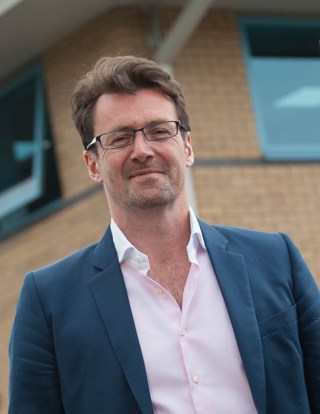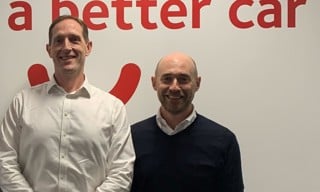I was kicked out of home at 17 so I had to grow up fast.
I got a job as a public area cleaner at a Holiday Inn.
It wasn’t a good job but I did it for three months and I did it really well because if you do something really well and you work for a decent company you will be recognised for that and you will get other opportunities.
I’ve always been a bit of a petrol head and somebody said to me ‘what you want to do is get into car sales’ but I didn’t fancy being a car salesman.
My favourite programme at the time was Minder with Terry McCann and Arthur Daley so a car salesman, to me, was always wearing a sheepskin coat and trilby hat.
I went to see a recruitment consultant Alastair Ames who got me an interview with Highway Vehicle Leasing.
At the interview they said ‘well, you’re a bit of a risk because you’re not the typical type of sales person we take on’ and when I started with Highway I realised why.
I think I was at least 10 years younger than anybody else on the sales team. They were all in their mid-30s or early 40s and there I was at 24.
I joined Highway on August 1, 1988, which in those days was the new registration date so I was almost like a new registration.
I remember sitting down on my first day and they said ‘right, here is a book on how it’s done, go and sit down in a corner and read this’ and after about three or four days with me asking lots of questions I said ‘I think I’m ready’ so they sent me out on an appointment and I came back with my first two contract hire orders. It was obviously destiny.
My New Year’s resolution on January 1, 1996 was to really focus on going the extra mile.
I made a real commitment: right I’m going to work my socks off this year because otherwise in 20 years’ time I’m going to be doing the same job and I don’t want to be doing the same job, I want to get into running the team and being my own boss.
Later that year I got my first management role when Highway was sold to General Guarantee Finance, part of GUS (Great Universal Stores).
It already had a contract hire company called White Arrow and I was given the opportunity to go over to Worcester to manage a team of 15 people, including a contract administration team, and integrate White Arrow into Highway.
It was probably the making of me.
Whenever you merge two businesses together you end up with some duplication.
Within three months of taking that on I had to make two people redundant, with no management experience.
I remember having a conversation with my then managing director Colin McLean who put it very well to me that ‘sometimes to make a tree grow big and strong you have to prune it’.
Having to make two people redundant was the most awful experience of my life and I vowed when that happened I would do everything in my power to make sure it never happened again.
As we started to grow I had to recruit some administrators.
I had some interviews lined up and I had absolutely no idea how to interview anybody so I went out and bought a paperback on 100 best interview questions.
I realised very quickly all you’ve got to do is make people feel at ease, try to find out what their motivations for coming for the job are, what sort of people they are and whether they would fit with the rest of the team.
Two or three years later we decided to move the entire administration of Highway over to Worcester and I ended up running a team of 55 people.
Then when we were bought by First National Bank and became part of First National Contracts I ended up running the whole of corporate for First National, which was about 35,000 vehicles, and I inherited a team in Manchester.
In 2001 we became part of the largest leasing company in the UK, Lloyds TSB Autolease.
I spent a year on the integration between Lloyds and First National but then an opportunity arose where I could make myself voluntarily redundant.
After 12 months at a bank-owned leasing company with all the bureaucracy and red tape that goes with that I decided that would be a very good idea.
I had a choice between working at Tusker and a position on the senior management team at a top five leasing company.
Tusker was pretty much a start-up company in 2000.
It was the idea of two guys who were a bit ahead of their time in as much as they’d come up with this idea that everything was going to be done online and they had persuaded venture capitalists (VCs) to invest £5.8 million on designing state-of-the-art systems and three years later in 2003 the business was losing £185,000 a month.
It had something like 42 staff, the two founders had left and the VCs were looking for someone very salesy to come in, see whether it was worth saving, turn it around, and, ultimately, become managing director.
The entrepreneurial side of me chose Tusker and I did get a couple of calls from people saying ‘you’re mad, Tusker will be out of business within 12 months, what do you think you’re doing? And you’ll get the blame for it all’.
The first two or three years at Tusker were a hard slog.
It was just simply working 70 hours a week and bringing everyone along with me because you can’t do it by yourself.
If you can get people motivated and get them to buy into the journey you want to take it makes it an awful lot easier.
From August 1, 2003, to the end of that year I think we lost £2.2million but by 2005 we were within spitting distance of breaking even and it was November 2005, just two years after joining Tusker, that I was given the opportunity to take over as managing director.
My sole objective for 2006 was to break even so we had to get through it, get out of the red and into the black, and we managed to do that.
I can’t say I ever hankered after being an MD or CEO but I’ve always liked to be in charge so I suppose that is just my personality.
If I’m in a group situation and we’ve got to do a task I can’t help but say ‘right, come on, you do this, you do that, let’s do this, let’s do that’.
I guess it’s naturally the way I am. And having been in sales for 30-odd years I’ve never been ‘accused’ of being shy and retiring.
In 2008 we, like everybody else, came up against the credit crunch and the whole world turned upside down.
I think necessity is the mother of invention and decided that we weren’t going to survive as a contract hire and leasing company.
All our funders went away apart from one and they were charging a fortune for the mone, so we had to come up with something different and that’s when we came up with the idea for salary sacrifice car schemes.
We thought we’d invented it but, of course, we hadn’t. The PwC (PricewaterhouseCoopers) choices scheme had been around for about 14 years but we found that out later.
If you believe in something you’ve got to commit to it and make it happen.
In the first 12 months of salary sacrifice we took a whole 61 car orders and our VCs were getting a bit fed up.
They kept saying to us at every board meeting ‘we think you’re wasting your time on this salary sacrifice lark’ and for about six or seven months on the trot we’d say ‘no, this is the future, just bear with us, this will pay dividends in the end’.
By later 2009 I think we launched some very big salary sacrifice accounts and the momentum started to take hold to the extent that now we have 335 schemes, 19,500 to 20,000 vehicles and growing like billy-o.
Without doubt from a career perspective my biggest achievement is being the CEO of a successful top 15 FN50 leasing company.
It has grown phenomenally over the past five or six years and has earned the respect of the rest of the leasing industry.
There are nearly 170 people that work at Tusker now, and when I think about what Tusker has done for everybody – the Tusker marriages, the Tusker kids, the Tusker families – and what it has enabled that makes me very proud.



















Login to comment
Comments
No comments have been made yet.